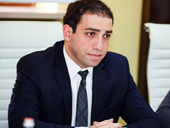
Govít Affiliate Named Among Candidates for Chief Prosecutor
By Gvantsa Gabekhadze
Monday, July 9
A current Head of the Government Administration of Georgia, Shalva Tadumadze has been named among three candidates nominated by acting Justice Minister for the countryís new Chief Prosecutor.
The opposition and the civil sector were strongly against the Justice Ministerís involvement in the selection process of a new Chief Prosecutor, as they believed the rule would lead to the election of the Georgian Dream government affiliate in the post.
The selection of the new Chief Prosecutor was on the agenda as Irakli Shotadze, who was the first Georgian Chief Prosecutor elected by parliament in 2016, resigned on May 31, amid large-scale protests regarding the high-profile murder case of two teenage boys in Tbilisi last year.
Acting Justice Minister, Mikheil Sarjveladze nominated three candidates for the position of Chief Prosecutor on Friday.
He held consultations with non-governmental and academic field representatives and selected the current Head of the Government Administration of Georgia Shalva Tadumadze, Assistant Professor of Tbilisi State University, Nino Gogniashvili and former lawmaker from the Free Democrats opposition party, Shalva Shavgilidze out of 18 proposed candidates.
The changes made to the law in 2015 read that the Chief Prosecutor must be elected, not appointed.
After the selection of the three candidates, the prosecutorial council - also formed in the 2015 bill and chaired by the minister of justice - nominates one individual for the position.
Eight members of the council are prosecutors elected by the Conference of Prosecutors, which was also a new structure suggested in the bill.
Members of parliament (MPs) have two seats; one from the majority and one from the opposition, while one seat is held by a civil society representative and another from an academic. Two seats are occupied by judges of the High Council of Justice.
The Council must approve one candidate by vote; the successful nominee must gain two thirds of the councilís support.
If this fails, the justice minister will be required to name three other candidates.
However, if selected, the chosen candidate will go before the government for approval. If the candidate is not approved, the process of selecting nominees begins again. If endorsed, the candidate must be approved by the Parliament.


